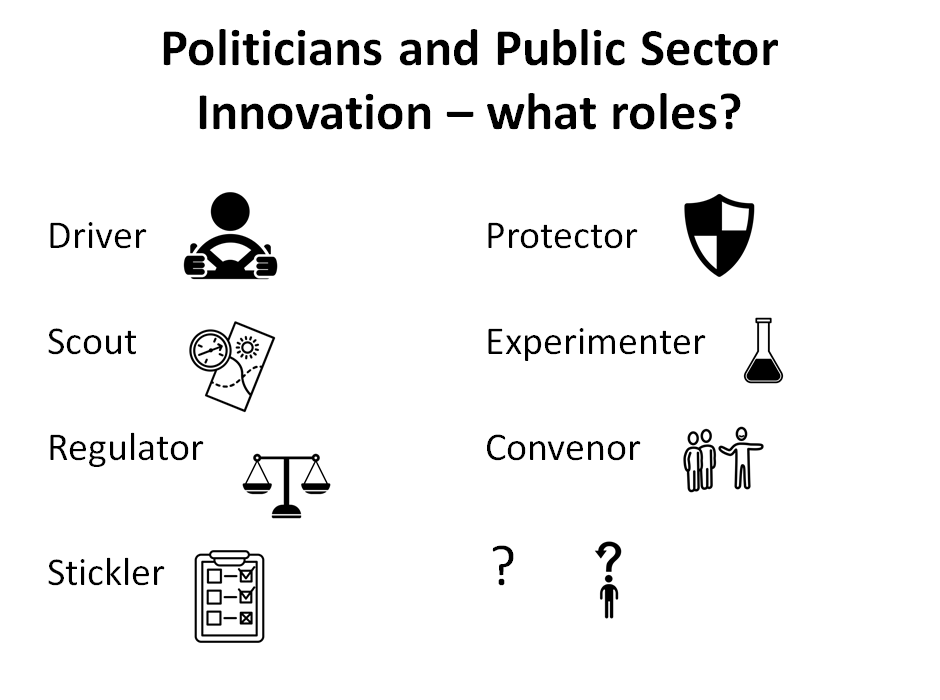Public Sector Innovation and Politicians

What roles can a politician play if they want to help promote, push or steer public sector innovation?

Our focus here at the Observatory on Public Sector Innovation tends to concentrate on the public service side of things: what government organisations can do to develop and implement more sophisticated approaches to innovation. That involves looking at institutions (what are the frameworks and settings that allow/inhibit innovation), at organisations (how can different administrative practices and structures support innovation), and individual public servants (what can help individuals and teams in undertaking innovative projects).
But we also need to understand the wider system and the roles that other players (civil society, private sector, social movements, other governments) can have.
For instance, what role do politicians play? They are, after all, a vital part of the public sector. They direct policy, they decide on many of the operating parameters of the public service, and just as importantly, their role is to have a much closer connection to citizen concerns. And just like civil servants, there are some politicians who want to drive innovative changes, who are keen to see new solutions for particular problems, or who just think the current state of affairs is not good enough. And also just like civil servants, they can sometimes be popularly characterised as barriers or blockers to innovation (e.g. the stereotypes that public servants resist change; that politicians are only concerned with short-term deliverables and announceables). Yet, as we know with public servants, there are many who will want to make or enable change that gets new and better outcomes for citizens.
What then are the some of the roles that politicians can play in driving innovation?
Of course one of the clearest roles is when politicians have an official responsibility or function in regards to public sector innovation. This may involve an officially demarcated Cabinet-level responsibility, such as Denmark’s Minister for Public Sector Innovation, or it may be having a designated political champion for public sector innovation, such as happens in Singapore.
But what are the other roles – the ones where politicians know they want to make a difference and try to pursue it even if they are not “responsible” for doing so? We’re interested in exploring this question further, and would like to hear from you about any different roles that you have seen politicians play.
To start the conversation, the following are some roles that I have seen or observed politicians (elected or appointed) play, whether as a member of government (including as part of executive), or in a non-governing/opposition capacity:
- Driver: this is where a politician is effectively the force behind a particular innovation, and where they have a passion or interest in driving (the) reform. An oft-pointed to example here would be the UK’s Francis Maude, Lord of Horsham, who not only led a number of civil service reforms, but who was also broadly responsible for the creation of the Government Digital Service. In this role the driver may or may not be the “owner” or originator of the idea, but they are the one that helps shepherd it through the system and overcome the hurdles that can arise. They can also be the (popular) face of an innovation, where public servants may be unable or unwilling to be. In this capacity they can work to secure political support for the initiative, and help start or embed its integration into the system.
- Experimenter: this role involves the politician testing out new approaches, methods or thinking, giving room for new ideas. One example I have seen of a politician playing this role was the Hon. Kate Lundy in Australia, where as a member of the Government (but not part of the Executive) she and her staff ran a Public Sphere series of in-person and digital consultations to bring together different knowledge, experiences and perspectives (so think a more sophisticated form of crowdsourcing). Another Australian example was Policy Hack in 2015, an experimental use of a hackathon to feed directly into the policy-making process. The Policy Hack was sparked by the Hon. Wyatt Roy who was then the Assistant Minister for Innovation. The Experimenter role allows for new methods to be tested, either outside of or within the public sector. This can not only influence other politicians and help them see what is possible, but it can also provide the public sector more broadly a means to see how or whether a new approach might work.
- Convenor: In this role the politician brings together relevant players around a particular problem or innovation. This might not be so much about driving the innovation, but about setting the conditions for others to either come up with an innovation, or to give legitimacy and support to an already identified innovation. By providing visible political leadership, the convenor can help enable/push the relevant system or players to come together and (co)create an innovative vision or plan of action.
- Stickler: Government accountability process (oversight bodies, committees, inquiries) are sometimes viewed (by public servants) as antagonistic or generally unsupportive of innovation. Yet, politicians can also use existing rules and process to great effect in supporting innovation. This might be through persistent attention around an area of sub-par performance, which can help focus a light on an area where innovation is needed. It may also be through forensic scrutiny of the roll-out of a major innovative project, thereby identifying where there are (or could be) implementation issues that may have otherwise gone unnoticed or unaddressed. This may not be a comfortable role for the public service, but such scrutiny can be a blessing in disguise for innovation.
- Scout: Here a politician may be the lone voice about an emerging or previously unnoticed issue. They can bring attention to a problem requiring an innovative response that others have either not registered, or would prefer to ignore. Their attention can help create the “organisational demand” and kick-start the innovation process. Alternatively, they may identify potential opportunities early on, and advocate or push for the public sector to engage with them.
- Regulator: Regulation is not always seen as an easy fit with innovation, but sometimes innovations require new frameworks and legislation in order to thrive. This may be because previous frameworks prevent the use of new technologies or business models (e.g. many taxi frameworks made ride-sharing illegal by intent or be default). Or it may be because no one foresaw the possibility and so there is no real framework to draw on (e.g. the fit between drones and aviation). Politicians can play an important role as a regulator for driving innovation within the public sector, whether it be through new requirements placed on the public service (or removing old ones), or by creating frameworks that effectively require innovation if the public sector is to comply with the law. Or it may be about trying to develop anticipatory regulation, that seeks to set standards for the future, thereby driving innovation and/or reducing the chances of future innovations encountering legislated roadblocks.
- Protector: In this role the politician can act to provide the political cover or safety needed for the public service to undertake the innovation. This may be through helping set expectations (“this is an experiment, and it may not work, but that is okay because it will help us improve our services by letting us know what is effective and where we should best spend our limited resources”). Or it may be about advocating for the public service when something has not worked (“while it is regrettable that this initiative has encountered difficulties, this organisation has a long history of delivering good results and I think we need to acknowledge that expecting something as innovative as this to work perfectly straight away is both unrealistic and unfair”). This is more than a defensive role, it is about letting the public service know that someone is backing it, and believes in what they are doing.
And of course, many times a politician can play several of these roles, combining different aspects In one, or sequentially (e.g. scout, experimenter, then driver).
What do you think? Have you seen other roles that politicians have played in supporting or driving innovation? Are there specific examples that you can point us to that help illustrate these roles? Let us know, either by email or in our LinkedIn discussion group.












